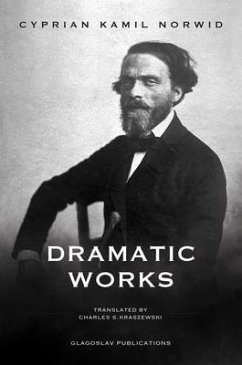'Perhaps some day I'll disappear forever,' muses the master-builder Psymmachus in Cyprian Kamil Norwid's Cleopatra and Caesar, 'Becoming one with my work...' Today, exactly two hundred years from the poet's birth, it is difficult not to hear Norwid speaking through the lips of his character. The greatest poet of the second phase of Polish Romanticism, Norwid, like Gerard Manley Hopkins in England, created a new poetic idiom so ahead of his time, that he virtually 'disappeared' from the artistic consciousness of his homeland until his triumphant rediscovery in the twentieth century. Chiefly lauded for his lyric poetry, Norwid also created a corpus of dramatic works astonishing in their breadth, from the Shakespearean Cleopatra and Caesar cited above, through the mystical dramas Wanda and Krakus, the Unknown Prince, both of which foretell the monumental style of Stanislaw Wyspianski, whom Norwid influenced, and drawing-room comedies such as Pure Love at the Sea Baths and The Ring of the Grande Dame which combine great satirical humour with a philosophical depth that can only be compared to the later plays of T.S. Eliot.
¿All of these works, and more, are collected in Charles S. Kraszewski's English translation of Norwid's Dramatic Works, which along with the major plays also includes selections from Norwid's short, lyrical dramatic sketches - something along the order of Pushkin's Little Tragedies. Cyprian Kamil Norwid's Dramatic Works will be a valuable addition to the library of anyone who loves Polish Literature, Romanticism, or theatre in general.
Translated from the Polish and introduced by Charles S. Kraszewski.
This book has been published with the support of the ©POLAND Translation Program.
Publishers Maxim Hodak & Max Mendor.
¿All of these works, and more, are collected in Charles S. Kraszewski's English translation of Norwid's Dramatic Works, which along with the major plays also includes selections from Norwid's short, lyrical dramatic sketches - something along the order of Pushkin's Little Tragedies. Cyprian Kamil Norwid's Dramatic Works will be a valuable addition to the library of anyone who loves Polish Literature, Romanticism, or theatre in general.
Translated from the Polish and introduced by Charles S. Kraszewski.
This book has been published with the support of the ©POLAND Translation Program.
Publishers Maxim Hodak & Max Mendor.
Dieser Download kann aus rechtlichen Gründen nur mit Rechnungsadresse in A, D ausgeliefert werden.









